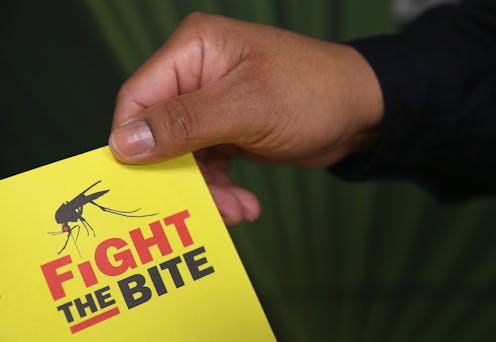News
Why These Athletes Are Skipping The Olympics
The Olympics are often conducted against a backdrop of safety concerns, and this summer's games have been no exception. Concerns about Rio de Janeiro's high pollution were raised last summer and Brazil's recent political shakeup has fueled new anxieties over security. But nothing has come close to the level of concern sparked by the World Health Organization designating the Zika virus a global emergency. So is the Zika virus causing athletes to skip Brazil's Olympic Games? In February, the United States Olympic Committee told U.S. sports federations that participants and staff concerned about the potential Zika threat should consider skipping the games.
As more and more cases of Zika — a virus transmitted by mosquitoes — have been uncovered in Latin American countries like Brazil and public health officials have announced that they suspect the virus is linked to the rare birth defect microcephaly, discussion of postponing or moving the Olympic Games has grown. Although a few athletes have announced that they would not participate due to concerns over Zika, the majority seem determined not to let the potential health risk keep them competing.
Despite golf's epic return to the Olympics this year, two of Australia's top golfers have announced they won't play due to concerns over the virus. Marc Leishman told Golf Channel that it was ultimately an easy decision to remove his name from the list of potential Australian Olympians:
Last April, my children and I almost lost my wife Audrey to toxic shock syndrome. Since then, Audrey has been prone to infection and is far removed from 100 percent recovery of her immune system. We have consulted with Audrey's physician and due to her ongoing recovery and potential risks associated with the transmission of the Zika virus, it was a difficult yet easy decision not to participate.
Fellow Australian golfer Adam Scott did not cite the Zika virus as his reason for withdrawing as a potential Olympic contender when he first announced he would not go to Rio, but he has since admitted it was a factor in his decision. "I have not used it as an excuse, although it would be very convenient to do so. It is only part of my concerns," Scott told Newsweek in early May.
Scott also expressed concern for athletes who have chosen to attend, saying:
When the World Health Organization has serious concerns over the impact that hundreds of thousands of people flooding into Rio is going to have, I think we should listen ... it has to be treated seriously and I just don’t think it is. It hasn’t really got major traction yet and I am amazed by that.
While numerous other Olympic athletes have expressed serious concerns about the Zika virus, most have refrained from withdrawing from the games thus far. Britain's Olympic heptathlon champion, Jessica Ennis-Hill, said that concern over Zika and a desire to have more children someday is causing her to consider skipping a pre-Olympic training camp in Brazil. Similarly, Hope Solo, goalkeeper for the US women's soccer team, told Sports Illustrated in February she was seriously considering opting out of the Olympics due to fears about the Zika virus:
If I had to make the choice today, I wouldn't go. I would never take the risk of having an unhealthy child. I don’t know when that day will come for Jerramy and me, but I personally reserve my right to have a healthy baby. No athlete competing in Rio should be faced with this dilemma. Female professional athletes already face many different considerations and have to make choices that male professional athletes don't.
Solo has since said that she will "begrudgingly" go.
The health and safety of Olympic athletes are always top priorities during the Games, but the Zika virus has certainly thrown a wrench in this year's Olympic preparations. Although all athletes need to weigh the potential risk of contracting the Zika virus against their gold-medal dreams, female athletes are put in an especially difficult place. Solo is right: They athletes shouldn't be asked to choose between the health of any future children and pursuing their athletic goals.
